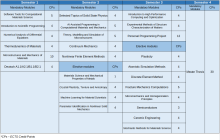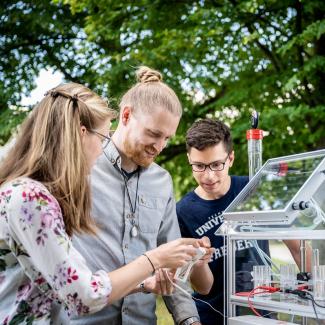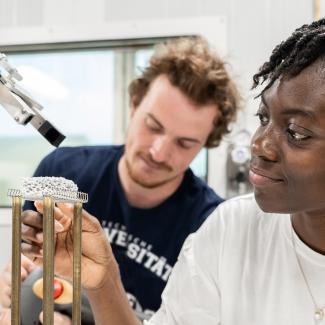Computational Materials Science
The constantly accelerating technological progress of today's society requires engineers and scientists who have a sound knowledge of natural and materials sciences and are able to apply programming and simulation techniques as well as data processing and analysis.
Computational Materials Science graduates become key players in industrial research and development; they shape scientific and engineering research that focuses on the design, processing and application of novel high-tech materials with superior mechanical, thermodynamic and electronic properties.
At TU Bergakademie Freiberg, we bring together renowned researchers and enthusiastic lecturers from different scientific fields to provide our students with the education they need for an outstanding career in Computational Materials Science (CMS).
Theoretical concepts presented in the CMS lectures are illustrated by state-of-the-art research applications. An intensive introductory seminar brings students up to speed with scientific programming and modern computing environments. During the research seminars, they have the opportunity to exchange ideas with leading scientists and experienced engineers at the industrial partners. In accompanying practical exercises, students learn how to apply all relevant modern simulation methods - and that is just one of the truly outstanding aspects of this degree programme. In elective subjects, you will be introduced to special topics in computational engineering/mechanics - or to advanced topics in data mining and machine learning in data-driven materials science.
Among other things, you will learn the theoretical background and practical application of the following numerical/simulation methods:
- Linear/nonlinear finite element methods (FEM)
- Molecular statics and molecular dynamics (MS/MD)
- Machine learning (ML), in particular Deep Learning (DL)
- Phase Field Methods (PFM)
- Statistical Analysis Methods
- Digital Image Analysis/Correlation
- Monte Carlo Methods (MC)
- Cellular Automata (CA)
CMS students are in the top 5% of their year, which ensures an intensive study environment with excellent performance. Small classes encourage interaction and discussion and allow you to develop your ideas. In addition, the study environment shines with an exceptional ratio of teaching staff to the total number of students enrolled.
For more, constantly updated information, visit the extra pages at https://cms-tubaf.de.
Please note that this is an English-language Master's degree programme. Applications can be made online via the applicant portal and are possible for the winter semester from 1 January to 15 April.
- Faculty
-
Faculty of Mechanical, Process and Energy Engineering (Faculty 4)
- Degree
-
Master of Science (M. Sc.)
- Standard period of study
-
4 Semester
- Part-time possible
-
No
- Start of studies
-
Winter semester
- Admission requirement
-
- a first professionally qualifying university degree of at least six semesters in mechanical engineering, materials science, solid state physics or a comparable degree programme
- qualification assessment procedure in accordance with Annex 2 (proof of the required professional aptitude)
English language skills
- TOEFL 90 points (internet-based test) or
- IELTS 6.5
- Course language
-
English
Automotive industry, metallurgy, microelectronics, materials production and process or safety assessment
Why study Computational Materials Science at TUBAF?
CMS is a unique multidisciplinary programme. The focus of CMS is on the modelling and simulation of material behaviour on different length scales. Programming is also carried out for this purpose, from smaller software tools to code extensions and larger programming projects. Who is the programme suitable for? Those interested
- who are interested in and enjoy solving tasks and problems in physics/mechanics/materials science with computers,
- who want to understand how engineering problems can be modelled with a mathematical description of physical laws and solved using modern computer methods,
- who want to simulate material behaviour on very different length scales, from the atomic level to large-scale structures.
- are interested in combining theoretical concepts with project-related applications.
- are enthusiastic about AI methods such as machine learning and deep learning in particular.
Requirements for the degree programme
- A first professionally qualifying university degree of at least six semesters (e.g. Bachelor's degree) in the fields of mechanical engineering, civil engineering, aerospace engineering, materials science, physics, applied mathematics and computer science or in a comparable subject area
- Proof of English language skills through a recognised language test such as the Test of English as a Foreign Language (TOEFL) with at least 90 points (internet-based test) or the International English Language Test System (IELTS) with a score of at least 6.5 or equivalent.e.g. the Test of English as a Foreign Language (TOEFL) with at least 90 points (internet-based test) or the International English Language Test System (IELTS) with a result of at least 6.5 or an equivalent test with a corresponding result. English as a native language (not the national or official language) is recognised as equivalent.
"I liked the way CMS was structured as lectures and tutorials. It gave us a much needed hands-on experience of using programming languages and solving problems associated with the lecture topics. CMS kept me busy and excited day in and day out with its new interdisciplinary dimensions. I got a stronghold in programming by the end of the course. I have always stood out in my workspace for the engineering and programming skills that I bring to them. Overall, it has been an incredible journey for me."
Additional contact information
If you have any questions, please contact the Dean of Studies of the Computational Materials Science programme, Prof. Dr.-Ing. habil. Bernhard Eidel (for contact details see contact box) or
Dr Egle Dietzen
Dean's Office of Faculty 4
Leipziger Straße 30, 09599 Freiberg
egle [dot] dietzen [at] dekanat4 [dot] tu-freiberg [dot] de (egle[dot]dietzen[at]dekanat4[dot]tu-freiberg[dot]de)
+49 3731 39-3094





